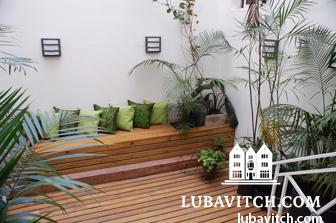(lubavitch.com) It’s an art class and a fully-equipped gym. It’s a kosher café and a smorgasbord of classes. It’s computer courses and a library. It’s an event space and a rooftop lounge.
It is Beit Jana (pronounced Beit Chana). And the women of Buenos Aires can’t get enough of it.
Since its opening in late 2008, Beit Jana’s 450 members have enjoyed the center’s varied educational and recreational offerings. The five-story structure, formerly a warehouse, was remodeled for the Jewish women of this bustling Argentinean city.
Music piped through the hallway mingles with sounds of aerobics and dance classes and the beautiful décor is evocative of an exclusive country club. Open from nine in the morning until nine at night, Beit Jana’s days are packed with stimulating classes and hundreds of ladies.
“Women are always nurturing,” explains Mrs. Shterna Grunblatt, co-director of Chabad of Argentina and director of the local Chabad school system. “They are always giving to their families, communities, and schools. They need a chance to get nurtured as well. Beit Jana is a place for women to get together, meet friends and help each other. It is an outlet for each woman’s different talents, aspirations, and needs.”
Roughly 200 women (organizers expected a third of that) showed up for a pre-Shavuot event in Beit Jana’s second floor auditorium. A guest lecturer spoke about the relevance of the giving of the Torah to women; a talented baker shared her signature cheesecake recipe. Speaking about the women’s role in passing down Jewish tradition were three generations of a local family, a grandmother, mother, and daughter, who shared their stories and tips.
Aside from holiday events, Shabbat afternoon gatherings, and monthly birthday parties, women congregate here for any of 30 regular classes: 15 scholarly courses and 15 art and recreation offerings. Weekly lessons include classes on Chassidic thought, Jewish law, Kabala, and art; marriage and parenting workshops, childbirth classes, and exercise courses are popular offerings as well.
“It is a necessity,” insists Mrs. Chaya Abelson. “We are responding to the needs of the contemporary Jewish woman.” Abelson, a social psychologist and coordinator at Beit Jana, says the idea for such an institution germinated several years before at a community retreat. “I gave a class on Torah and communication based on my knowledge as a social psychologist and the Chasidic ideas and Torah I had learned during my years in Chabad. The women were fascinated and wrote a letter to Rabbi Grunblatt requesting a school for women.”
At the time, the economic forecast was gray and there was no money for the endeavor. The situation changed last year when Mrs. Ruth Lapidus and her husband, Chaim, donated the building and its reconstruction.
Grunblatt acknowledges the tremendous financial strain the center incurs, buts says gratefully that a group of donors remains committed to the project. “It is a financial sacrifice in the beginning,” she says. “But hopefully it will even out soon.” Monthly membership is 30 pesos; a regular gym is 80 pesos in monthly fees. To break even, Beit Jana must have 1,000 registered members.
Though Beit Jana is located in the religious section of town, Jewish women who come here to purchase kosher provisions, stop by for a class or a mug of coffee. And they keep on coming back. Abelson believes the center serves a purpose for each segment of the Jewish community.
“I see the need for Baalot Teshuva (newly Orthodox), many of whom became religious when already married, to have an opportunity to learn Torah, and to be able to find free expression of their talents and professions. As for women who are not yet acquainted with Judaism, Beit Jana plays a crucial role in recuperating society, family by family, through the pillar of the Jewish family, the Jewish woman.”
Ana Stern, Beit Jana’s executive director, hires staff, fundraises, and coordinates classes and events. She is passionate about this women’s haven and agrees with Grunblatt that its reach is much farther than Buenos Aires’ city limits.
“I believe that not only the women of Buenos Aires, but every Jewish woman needs to be able to participate in a place like Beit Jana. It is an innovative and unique project, still in its formative stage with a very promising future. I believe it will be a model for future Bais Chana’s worldwide.”
A website is nearing completion and Grunblatt hopes that leaders in other communities will turn to their example and create a similar venue for local women.
“After all,” she says, “they deserve it.”

Be the first to write a comment.